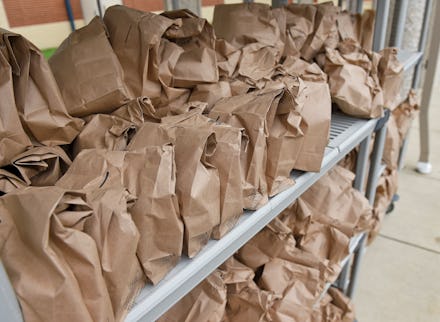Millions of kids will receive free lunches, thanks to Biden extending this vital food insecurity program

The Biden administration has extended a pandemic-era waiver program to provide free school lunches to all students for the coming 2021-2022 academic year, the Department of Agriculture announced Tuesday. The decision is a significant step toward addressing the plague of food insecurity which has affected an estimated 12 million children over the past year, according to the USDA.
"USDA will remain relentless in ensuring our nation's children get the critical nutrition they need," Agriculture Secretary Tom Vilsack said in a statement accompanying the announcement. "States and districts wanted waivers extended to plan for safe reopening in the fall. USDA answered the call to help America's schools and childcare institutions serve high-quality meals while being responsive to their local needs as children safely return to their regular routines."
"It's a win-win for kids, parents, and schools," he added.
The extension of the waiver program comes on the heels of a previous USDA decision to extend the free school lunches only through the end of September.
Citing a recently released study from Tufts University, the USDA noted that in recent years, schools have "provided the best mean diet quality of major U.S. food sources, without population disparities." Put more simply: Children receive the best nutritional value from meals served at schools.
The waiver program that will now extend through the coming school year is designed in part to allow schools more flexibility to serve meals to students outside the usual lunch times and places — a crucial feature that enabled millions of kids to receive meals during fully- or even partially-remote learning.
"Students' success in the classroom goes hand in hand with their ability to access basic needs like healthy and nutritious meals," Miguel Cardona, the education secretary, said in a statement. "It's critical that our efforts to reopen schools quickly and safely include programs that provide access to free, healthy meals for our most vulnerable students, particularly those whose communities have been hardest hit by the pandemic. This program will ensure more students, regardless of their educational setting, can access free, healthy meals as more schools reopen their doors for in-person learning."
With the extension now in place, the question becomes whether the Biden administration will make free school lunches a permanent feature of the American educational system.
"I've been in school meals since 1993. And when I came in ... the big push was universal feeding," Hattie Johnson, the director of nutrition services for Monroe County Community School Corporation (MCCSC) in Bloomington, Indiana, told The Christian Science Monitor earlier this month. "For a gazillion years, [the United States Department of Agriculture] would say we cannot afford it. Then, COVID. And all of a sudden we can afford it?"
In other words, if the government truly believes free school lunches are as important and vital as they claim they are, then an extension of a stop-gap program is a first step — but only the first — toward putting its money, and its food, where its mouth is.